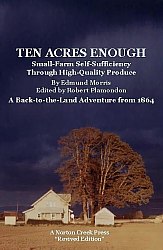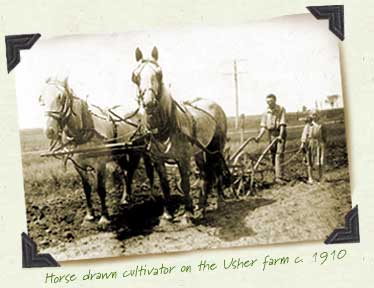
Ten Acres Enough
 Ten
Acres Enough was
originally published in 1864, but the farming memoir stands the test of
time extremely well. I picked up the Norton Creek Press edition,
which includes Robert Plamondon's occasional footnotes and careful
calculations of what the original dollar amounts would come to in
today's terms. If you don't mind foregoing those small
conveniences, though, you can
read the book online for free.
Ten
Acres Enough was
originally published in 1864, but the farming memoir stands the test of
time extremely well. I picked up the Norton Creek Press edition,
which includes Robert Plamondon's occasional footnotes and careful
calculations of what the original dollar amounts would come to in
today's terms. If you don't mind foregoing those small
conveniences, though, you can
read the book online for free.
Those of you who were
struck by the careful use of organic matter in Farmers
of Forty Centuries
will be intrigued by Edmund Morris's fascination with manure. His
first year on the farm, he spent $248 on manure ($5,700 in today's
dollars), and when he had more money on hand, he was happy to part with
$358 ($8,228 today) for manure during his third year. He chose to
keep his livestock completely confined and cut
clover from his field to feed them as a way of maximizing his homegrown
manure production, and he also collected tree leaves from the wild to
add to the compost pile. All told, perhaps a third of Ten
Acres Enough is
devoted to discussions of organic matter.
 The larger theme, though, is
how to make a simple but dependable living on a ten acre farm. I
doubt that an American farmer could follow Morris's lead today due to
competition with factory farms, but some of his points are just as
valid now as they were a century and a half ago. Morris believed
strongly that debt is the downfall of many a businessman (since he
struggled against the problem for the first many years of his
life). He was also keen on focusing on a quality product (unique
if possible) marketed to a wealthy urban clientele.
The larger theme, though, is
how to make a simple but dependable living on a ten acre farm. I
doubt that an American farmer could follow Morris's lead today due to
competition with factory farms, but some of his points are just as
valid now as they were a century and a half ago. Morris believed
strongly that debt is the downfall of many a businessman (since he
struggled against the problem for the first many years of his
life). He was also keen on focusing on a quality product (unique
if possible) marketed to a wealthy urban clientele.
In the introduction,
Robert Plamondon describes this classic text as follows: "Ten
years after Henry
David Thoreau
learned how to be a poor farmer, Edmund Morris learned how to be a good
one." I totally agree. If you're interested in a glimpse
into American small farm life in the 1850s, this quick and fun read is
the book for you.
Want more in-depth information? Browse through our books.
Or explore more posts by date or by subject.
About us: Anna Hess and Mark Hamilton spent over a decade living self-sufficiently in the mountains of Virginia before moving north to start over from scratch in the foothills of Ohio. They've experimented with permaculture, no-till gardening, trailersteading, home-based microbusinesses and much more, writing about their adventures in both blogs and books.
Want to be notified when new comments are posted on this page? Click on the RSS button after you add a comment to subscribe to the comment feed, or simply check the box beside "email replies to me" while writing your comment.
- Remove comment
- Remove comment
- Remove comment
- Remove comment
